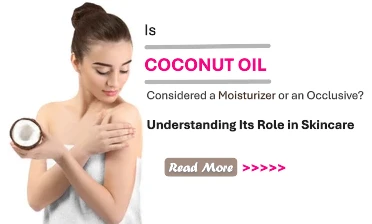Is Coconut Oil Considered a Moisturizer or an Occlusive? Understanding Its Role in Skincare
Is Coconut Oil Considered a Moisturizer or an Occlusive? Understanding Its Role in Skincare
Coconut oil has gained popularity in natural skincare for its rich texture, pleasant aroma, and multiple uses. But when it comes to skincare classification, many people wonder: is coconut oil a true moisturizer, or is it better described as an occlusive? The answer lies in how it interacts with the skin’s surface and deeper layers.
Moisturizers vs. Occlusives: What’s the Difference?
To understand where coconut oil fits in, it helps to clarify the difference between moisturizers and occlusives:
-
Moisturizers are ingredients that increase the water content in the skin by attracting water (humectants) or enhancing water retention (emollients).
-
Occlusives, on the other hand, form a physical barrier on the skin to prevent moisture loss by trapping water inside.
Examples of humectants include glycerin and hyaluronic acid, while petroleum jelly and mineral oil are well-known occlusives. Emollients, like squalane and shea butter, soften and smooth the skin and may have overlapping qualities.
Where Does Coconut Oil Fit In?
Coconut oil is primarily considered an occlusive and emollient, rather than a traditional moisturizer. It doesn't draw water into the skin like humectants do. Instead, it helps seal existing moisture by forming a protective layer on the skin’s surface. This barrier function reduces transepidermal water loss (TEWL) — a process in which moisture evaporates from the deeper layers of the skin.
Additionally, coconut oil contains fatty acids like lauric acid, caprylic acid, and myristic acid, which help to soften the skin and improve its texture, making it an effective emollient. The lauric acid also has antimicrobial properties, which can benefit certain skin types, especially when dealing with minor irritation or inflammation.
Does Coconut Oil Hydrate the Skin?
Not directly. While coconut oil feels moisturizing due to its rich and smooth consistency, it doesn’t actually hydrate the skin on its own. For hydration, water-based ingredients like aloe vera, hyaluronic acid, or glycerin are needed. However, applying coconut oil after these hydrating ingredients can lock in moisture and improve skin softness.
This makes coconut oil an ideal final step in a skincare routine, especially for dry or normal skin types. It helps maintain hydration levels by reducing water evaporation, especially in dry environments or during colder months.
When to Use Coconut Oil—and When to Avoid It
Coconut oil is best suited for:
-
Dry or flaky skin that needs extra sealing and softness
-
Body care, such as elbows, knees, or feet
-
Post-shower application to trap moisture
However, it may not be ideal for:
-
Oily or acne-prone skin, as it’s comedogenic and may clog pores
-
Facial use, particularly on areas prone to breakouts
Conclusion
Coconut oil is best classified as an occlusive and emollient, rather than a hydrating moisturizer. While it doesn’t add water to the skin, it plays a valuable role in preventing moisture loss and enhancing skin softness. When used correctly and on the right skin types, it can be a beneficial addition to a nourishing skincare routine.

Related Blog
What Causes Oily Skin and Can It Be Managed Naturally? Exploring Root Causes and Gentle Solutions
Aug 2, 2025 by Admin
General
What Are the Signs That You Have Sensitive Skin? Key Symptoms to Help You Identify This Delicate Skin Type
Aug 1, 2025 by Admin
General